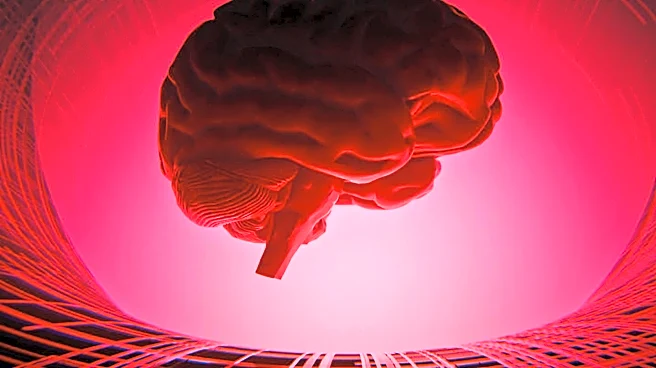What's Happening?
A recent study conducted by Weill Cornell Medicine has uncovered that hypertension, or high blood pressure, can cause damage to the brain even before noticeable increases in blood pressure occur. The research
indicates that hypertension affects blood vessels, neurons, and white matter in the brain, potentially leading to cognitive disorders such as vascular cognitive impairment and Alzheimer's disease. The study utilized advanced single-cell technology to analyze the molecular impact of hypertension on various brain cell types in mice. Findings revealed significant changes in gene expression in endothelial cells, interneurons, and oligodendrocytes just three days after inducing hypertension, prior to any rise in blood pressure. These changes included premature aging in endothelial cells and early signs of a weakened blood-brain barrier.
Why It's Important?
The study's findings are significant as they suggest that hypertension may contribute to cognitive decline earlier than previously understood, highlighting the need for treatments that address both blood pressure and brain health. With nearly half of Americans affected by hypertension, this research could influence public health strategies and medical practices. The study also points to the potential benefits of angiotensin receptor inhibitors, such as losartan, in reversing early hypertension effects on brain cells, which could lead to improved cognitive health outcomes. Understanding the cellular and molecular impacts of hypertension may pave the way for new therapeutic approaches to prevent neurodegeneration.
What's Next?
The research team plans to further investigate the mechanisms by which hypertension affects brain health at the cellular level. This could lead to the development of new medications that not only lower blood pressure but also protect against cognitive decline. Additionally, the study may prompt healthcare professionals to consider more comprehensive treatment plans for patients with hypertension, focusing on both cardiovascular and neurological health. Future studies may explore the long-term effects of hypertension on brain function and the potential for early intervention strategies.
Beyond the Headlines
The study raises ethical considerations regarding the treatment of hypertension, particularly in terms of balancing the benefits of blood pressure control with potential cognitive health improvements. It also highlights the importance of early detection and intervention in managing hypertension to prevent long-term brain damage. The findings may influence public health policies and encourage further research into the relationship between cardiovascular health and cognitive function.









